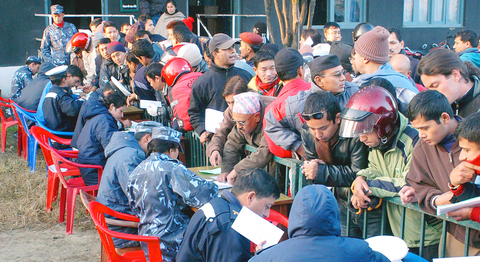Kathmandu was deserted yesterday as police and soldiers enforced a daytime curfew declared by the Nepalese government after a round-up of political activists aimed at heading off anti-king protests.
Some 120 people were detained for breaking the curfew, among them political activists, protesters and civilians, a police officer said.
Most of the civilians would be freed in the evening, he said without clarifying how many activists would remain locked up.

PHOTO: EPA
"Everything is normal, and there have not been any reports of incidents," said the officer, who asked to remain anonymous.
Armed police and soldiers were posted every few hundred meters on main roads, and were stopping and checking the few vehicles on the roads.
Kathmandu's picture-perfect Durbar Square, where seven opposition parties had planned to hold their rally early afternoon, was empty save for police, three holy cows and a troupe of monkeys.
Residents rushed to work before the 8am to 6pm curfew came into effect, but most businesses kept their shutters down as truckloads of police rumbled through the city and soldiers took up positions at key points.
The last time a daytime curfew was imposed in the capital was when King Gyanendra sacked the government and assumed full executive powers on Feb. 1 last year.
On Thursday, security forces detained 107 activists and political leaders and cut mobile telephone services in a crackdown condemned by the US, India, the EU and Japan.
More detentions
Further detentions were reported early yesterday.
"I was placed under house arrest this morning," Bharat Mohan Adhikari, a leader from the Nepal Communist Party (United Marxist Leninist) told AFP by telephone.
"Eleven armed police are stationed in my residence, and I understand that other leaders have also been placed under house arrest," Adhikari said.
Madhav Kumar Nepal, NCP (UML) general secretary, said he, too, was under house arrest.
"Armed police surrounded my house at 4am. They came inside at 6am and at 7:30am a police superintendent came and handed over a warrant," he said.
Nepal's seven main political parties, sidelined by the king's powergrab, had called yesterday's protest to demand the restoration of democracy and to call for a boycott of municipal polls on Feb. 8.
Evening protest?
With the daytime curfew in place and their leaders in detention, political parties were yesterday planning torch-lit processions and protests after 6pm.
"Spontaneous protest programs will be organized inside Kathmandu and [neighboring] Lalitpur once the curfew ends," said Bhanu Bhakta Dhakal, a member of NCP (UML).
For people on the streets, the curfew was an irritant.
"In the name of giving security, the government is creating a difficult time for the general public. I hope this won't last long. I hope this won't last long," said Sadhana Khadgi, a roadside vegetable seller.
Rights groups feared further human rights abuses.
"The government of Nepal should be aware the international community is gravely concerned with developments this week and should take immediate steps to remedy the serious human rights violations that have taken place," Purna Sen of Amnesty International said.

PRECARIOUS RELATIONS: Commentators in Saudi Arabia accuse the UAE of growing too bold, backing forces at odds with Saudi interests in various conflicts A Saudi Arabian media campaign targeting the United Arab Emirates (UAE) has deepened the Gulf’s worst row in years, stoking fears of a damaging fall-out in the financial heart of the Middle East. Fiery accusations of rights abuses and betrayal have circulated for weeks in state-run and social media after a brief conflict in Yemen, where Saudi airstrikes quelled an offensive by UAE-backed separatists. The United Arab Emirates is “investing in chaos and supporting secessionists” from Libya to Yemen and the Horn of Africa, Saudi Arabia’s al-Ekhbariya TV charged in a report this week. Such invective has been unheard of

US President Donald Trump on Saturday warned Canada that if it concludes a trade deal with China, he would impose a 100 percent tariff on all goods coming over the border. Relations between the US and its northern neighbor have been rocky since Trump returned to the White House a year ago, with spats over trade and Canadian Prime Minister Mark Carney decrying a “rupture” in the US-led global order. During a visit to Beijing earlier this month, Carney hailed a “new strategic partnership” with China that resulted in a “preliminary, but landmark trade agreement” to reduce tariffs — but

Chinese President Xi Jinping’s (習近平) purge of his most senior general is driven by his effort to both secure “total control” of his military and root out corruption, US Ambassador to China David Perdue said told Bloomberg Television yesterday. The probe into Zhang Youxia (張又俠), Xi’s second-in-command, announced over the weekend, is a “major development,” Perdue said, citing the family connections the vice chair of China’s apex military commission has with Xi. Chinese authorities said Zhang was being investigated for suspected serious discipline and law violations, without disclosing further details. “I take him at his word that there’s a corruption effort under

China executed 11 people linked to Myanmar criminal gangs, including “key members” of telecom scam operations, state media reported yesterday, as Beijing toughens its response to the sprawling, transnational industry. Fraud compounds where scammers lure Internet users into fake romantic relationships and cryptocurrency investments have flourished across Southeast Asia, including in Myanmar. Initially largely targeting Chinese speakers, the criminal groups behind the compounds have expanded operations into multiple languages to steal from victims around the world. Those conducting the scams are sometimes willing con artists, and other times trafficked foreign nationals forced to work. In the past few years, Beijing has stepped up cooperation